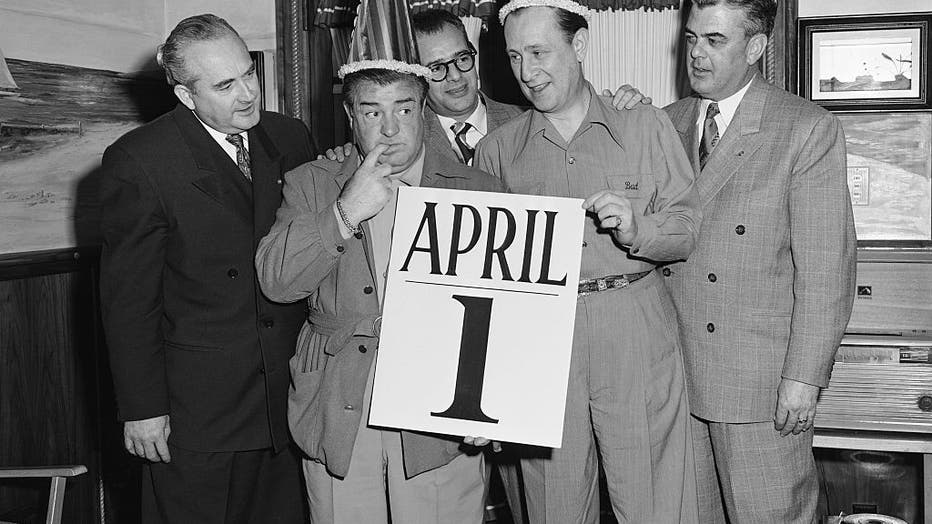When did April Fools’ Day start? The confusing history of April 1

Police set up April Fool's speed trap for trail users
Police set up an April Fool?s Day speed trap to catch hikers, runners, and dog-walkers moving at injudicious speeds on the Trinity Trails in Fort Worth, Texas. (Credit: Fort Worth Police Department via Storyful)
LOS ANGELES - Every year on April 1, people across the globe celebrate a strange and silly tradition: pranking friends, family, coworkers, and sometimes complete strangers. From elaborate fake news stories to goofy schoolyard tricks, April Fools’ Day has become a lighthearted chance to make someone laugh—or gasp in disbelief.
But why do we even do this? Despite how widely it’s celebrated, the origins of April Fools’ Day are murky at best. Historians have traced it back to Renaissance Europe, but no one can say for sure how it all started. What we do know is that, like the best pranks, the holiday’s backstory is full of half-truths, mystery, and misinformation—including a few hoaxes about the holiday’s history itself.
Why do we celebrate April Fools’ Day?
The backstory:
Though no single origin has been proven, many historians believe April Fools’ Day grew out of overlapping traditions across Europe. The practice of playing tricks in the spring may have connections to ancient Roman festivals, religious feasts, and changing calendars.
In France, the holiday is called Poisson d’Avril or "April Fish"—a reference to gullible fish that are easy to catch in spring, much like the unsuspecting prank victims of April 1. Meanwhile, in England, April 1 was once called "Fooles Holy Day."
And in a 1561 Flemish poem by Eduard de Dene, a nobleman sends his servant on an absurd errand—one of the first confirmed references to pranking on April 1.
Was it really about a calendar change?
What we know:
One of the most popular origin stories claims that April Fools’ Day began in 16th-century France, when King Charles IX switched the start of the new year from late March to January 1.
According to this theory, people who didn’t get the memo—or refused to follow the new Gregorian calendar—were mocked as "April fools." Others say the change came from Pope Gregory XIII’s reforms in 1582, which many European nations gradually adopted.
Rutgers folklorist Angus Kress Gillespie supports this calendar-based theory, noting that jokes work best on people who don’t realize what day it is—especially early in the morning.
Still, there’s little historical evidence to back the story, and many scholars consider it more folklore than fact.
Is there a definitive origin story?
What we don't know:
While some trace the holiday back to ancient festivals like Hilaria in Rome or even Druidic spring rites, no theory has been definitively proven.
In fact, one widely circulated story about Emperor Constantine creating April Fools’ Day as a "day of jollity" was actually a 1983 prank played by a Boston University professor on an Associated Press reporter. The AP ran it—then had to retract the story days later.

FILE - American comedians Bud Abbott (1897 - 1974) and Lou Costello (1906 - 1959) on April Fool's Day, early 1950s. (Photo by Gene Lester/Getty Images)
Even Geoffrey Chaucer’s "Nun’s Priest’s Tale," sometimes cited as the first English mention of April 1, contains wording so ambiguous that scholars still debate whether it actually refers to April Fools’ Day.
How April Fools’ Day evolved
Timeline:
Though the exact origin remains unclear, the tradition of April 1 pranks has persisted and evolved over centuries:
1561: Eduard De Dene’s poem shows the first concrete April 1 prank.
1686: John Aubrey refers to April 1 as "Fooles Holy Day" in England.
1700s: Pranking becomes more popular in North America, with references in early diaries and newspapers.
1800s: April Fools’ jokes evolve into elaborate gags—like heating coins or using string to yank away fake wallets.
1900s–Today: The rise of media and marketing leads to more high-profile hoaxes from brands and news outlets.
Why do we still celebrate it today?
Dig deeper:
What makes April Fools’ Day so enduring? Experts say it’s because the tradition is relatively harmless—and fun. Over the years, jokes have ranged from pranks among friends to large-scale hoaxes from respected organizations.
Some of the most famous examples include:
- A 1980 BBC radio prank claiming Big Ben was going digital.
- NPR’s fake 1992 story of Richard Nixon running for president again.
- Boston’s 2022 warning that cell phone light could damage statues in the public garden.
The secret to a good April Fools’ joke? Make it strange but just believable enough.
The Source: This article draws on reporting from the Library of Congress, Rutgers University, and NPR, along with academic folklore research. Historical examples and poems were cited from the Library of Congress Folklife Today blog, the Gallica collection of the French National Library, and early English texts, including the writings of John Aubrey and the Flemish poet Eduard de Dene. Rutgers folklorist Angus Kress Gillespie also contributed perspective on calendar-based theories of the holiday’s origin.

